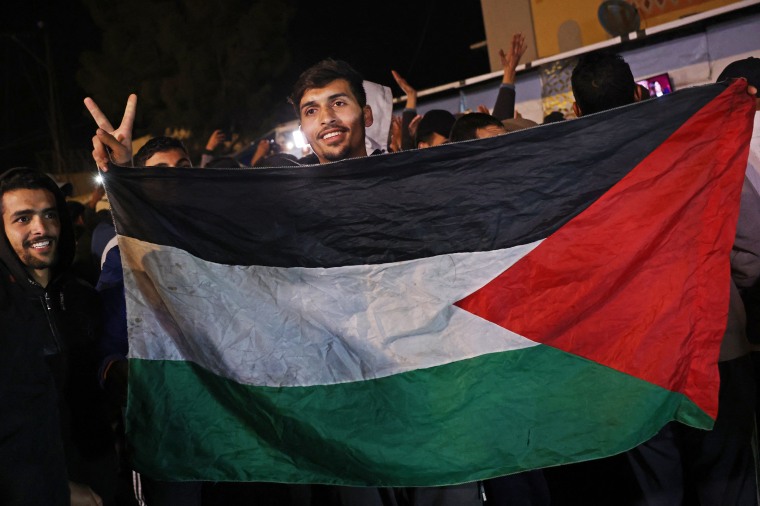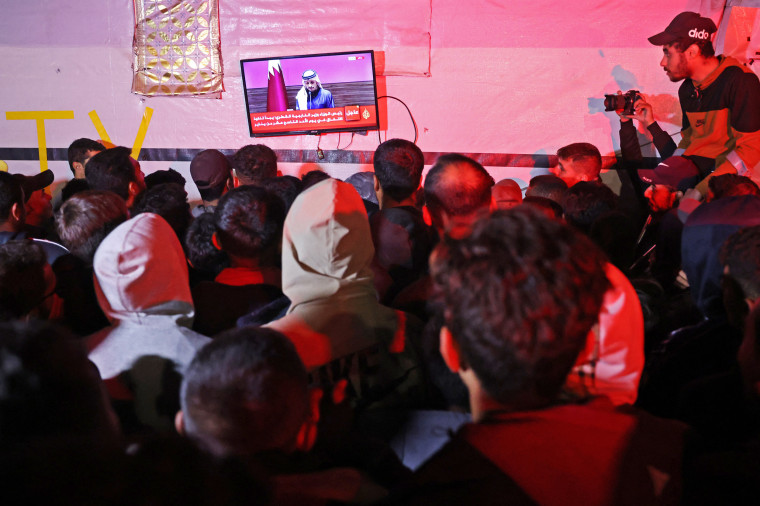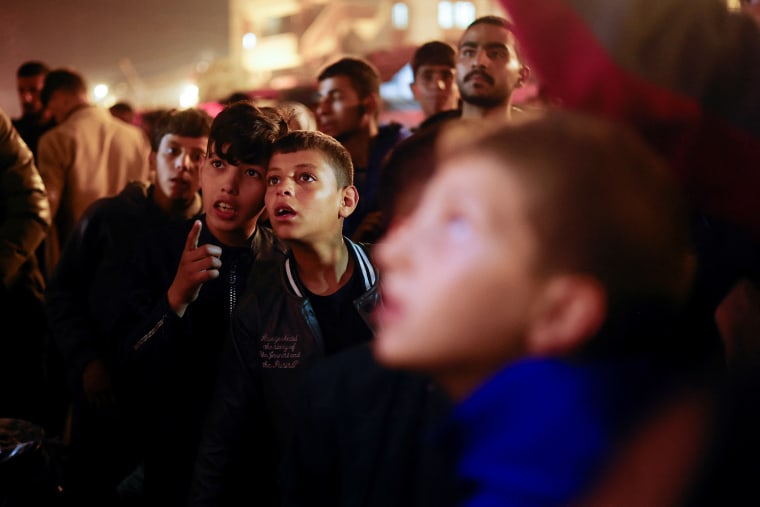Palestinians wept as they took to the streets across the Gaza Strip to celebrate the news that, after 15 months of devastating airstrikes and shelling, Israel and Hamas had finally agreed to a ceasefire deal.
Israel's ruinous air and land assault, began Oct. 7, 2023, after Hamas led a cross-border terrorist attack that Israeli officials say killed 1,200 people and saw 251 taken hostage. Since then, at least 46,000 Palestinians have been killed by Israeli forces in Gaza, most of them women and children, according to local health officials, and much of the enclave has been reduced to rubble.
“We spent more than a year and a half in havoc and destruction,” Ibrahim Abou Reezk told NBC News' crew on the ground in Gaza on Wednesday night. “Today, we express our joy—the most precious and valuable kind.”

As friends propped him up among the cheering crowd and bullets were fired in the air, he spoke of the relief brought on by the prospect of peace.
“Now we can sleep safely and comfortably; that’s it, nothing more,” he said.
Most of Gaza’s 2.3 million people have been forced from their homes during the war, which has also shattered the enclave's infrastructure and hospitals. It is unclear what the future holds for Gazans if the ceasefire lasts and once fighting ends — the enclave was blockaded by Israel and Egypt before the war and political solutions to the decadeslong conflict between Israel and the Palestinians appear as elusive as ever.
Inside the tent encampments of Khan Younis in southern Gaza, thousands of people were glued to television screens in anticipation of the deal’s announcement late Wednesday. Celebrations erupted soon after, with people spilling out into the streets to sing, dance and wave Palestinians flags.
The ceasefire deal, which would probably take effect Sunday, pending approval from the Israeli Cabinet, comes after intense negotiations and mediation from Qatar, Egypt and the United States.
Under a three-phase agreement, the deal would allow displaced Palestinians to return to their homes — if their homes remain — as Israeli forces withdraw to the Gaza border. The transfer of hostages and prisoners will also take place as humanitarian aid, hospitals and health care centers resume to serve civilians.
But Israeli Prime Minister Benjamin Netanyahu said Thursday he was delaying a Cabinet vote, accusing Hamas of reneging on parts of the agreement. Hamas says it is “committed” to the truce.
For many inside the Palestinian enclave, a ceasefire agreement offers not only the prospect of respite from airstrikes, but also the promise of returning home after months of displacement and taking shelter in makeshift tents inside refugee camps.
“We have been waiting for this moment of joy,” Zafar Abou Alarag said in Khan Younis.
But the relief was also tinged with worry as many spoke of rebuilding their homes after more than a year of devastation.
“We have gotten used to the tents and want to return to living,” Abou Alarag continued. “I want to return to my land, I want to build one room with a bathroom because there is no house.”

Waseem Elbalbasiy, who plans to return to his neighborhood of Shuja’iyya, told NBC News' crew on the ground in Gaza that “at least we can return to our homes to check on our families and loved ones who are gone, as well as those we have lost.”
“I wish to wake up and find myself inside my house, whether it is still standing or not,” he said.
Still, he added, “This ceasefire may have come late, but it is honorable.”
There's a chance the ceasefire may not come at all.
Hours after it agreed to a ceasefire, Israel launched fresh airstrikes that have so far killed at least 45 people, according to the Gaza Civil Defense.
The continuation of aerial bombing has prompted a confusing and heightened mix of emotions for many, serving as a reminder that the truce announced yesterday will come too late for many victims of this grinding war.
The news was yet another devastating reminder of losing family for Lamees Sahady Sobhy, a little girl in the Yarmouk playground in Syria’s largest Palestinian refugee camp, which stands on the southern outskirts of Damascus.
“How can I rejoice when my father and brother are dead, and my maternal uncles have also died?” she said. “I have no one.”

Behind her, crowds of young people were still gathered in the streets continued to chant, “The people of Jabalia are like fire, the people of Beit Lahia are like fire.”
The mixed emotions of jubilation and grief mirror the ambiguity that surrounds the armistice hard-won by American, Egyptian and Qatari negotiators after months of false dawns and near misses.
The phased nature of the deal means that fighting may yet resume in the coming weeks, a prospect that has further left many still mourning the loss of countless loved ones feeling anxiety, as well as hope.
“Honestly, my feelings are a mix of joy, sadness and pain,” Nabed Elzine, a displaced resident of Beit Lahia in the north, told NBC News.
“I am happy that peace may prevail,” he said. “At the same time, my heart squeezes in pain. We must not forget for a moment that there are thousands of bodies awaiting us beneath the rubble.”